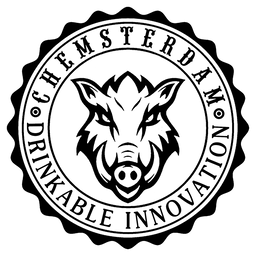Curing PTSD: The Multifaceted Journey of Hans, an Ultra Cyclist
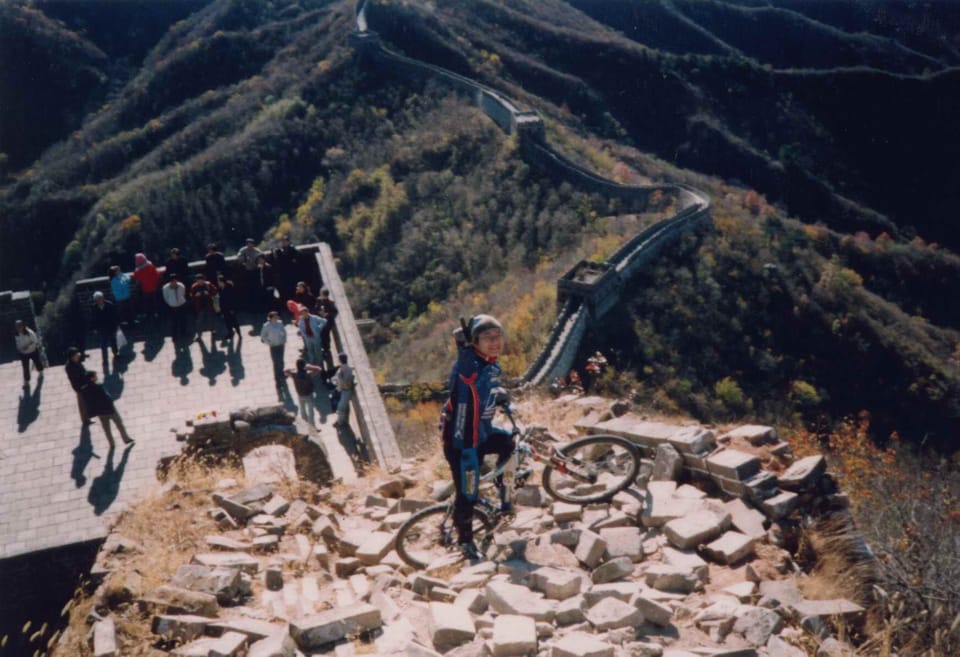
The founder of Chemsterdam, Hans, was and still is an ultra-cyclist. Cyclist was one of Hans facets of his life.
A Philosophical Athlete
Hans was a member of Sichuan Provincial Track-racing Team, a none-registered pro-cycling team supported by the local government, aiming to win medals as the only goal of existence. Hans is a product of China's state system that aims for Olympic gold medals, meaning "winning gold medals" is life, or even life itself, for some people, whereas sports themselves are not considered a form of entertainment or a necessity in life. This represents the era of Chinese sports at that time.
Due to China's large population, outstanding athletes are often selected from many youths who have natural advantages. Therefore, Hans, as a cyclist who switched from middle and long-distance running to track cycling and is known for his diligence rather than significant inherent advantages, was quickly replaced by younger, taller, and more hormonally advantaged newcomers.
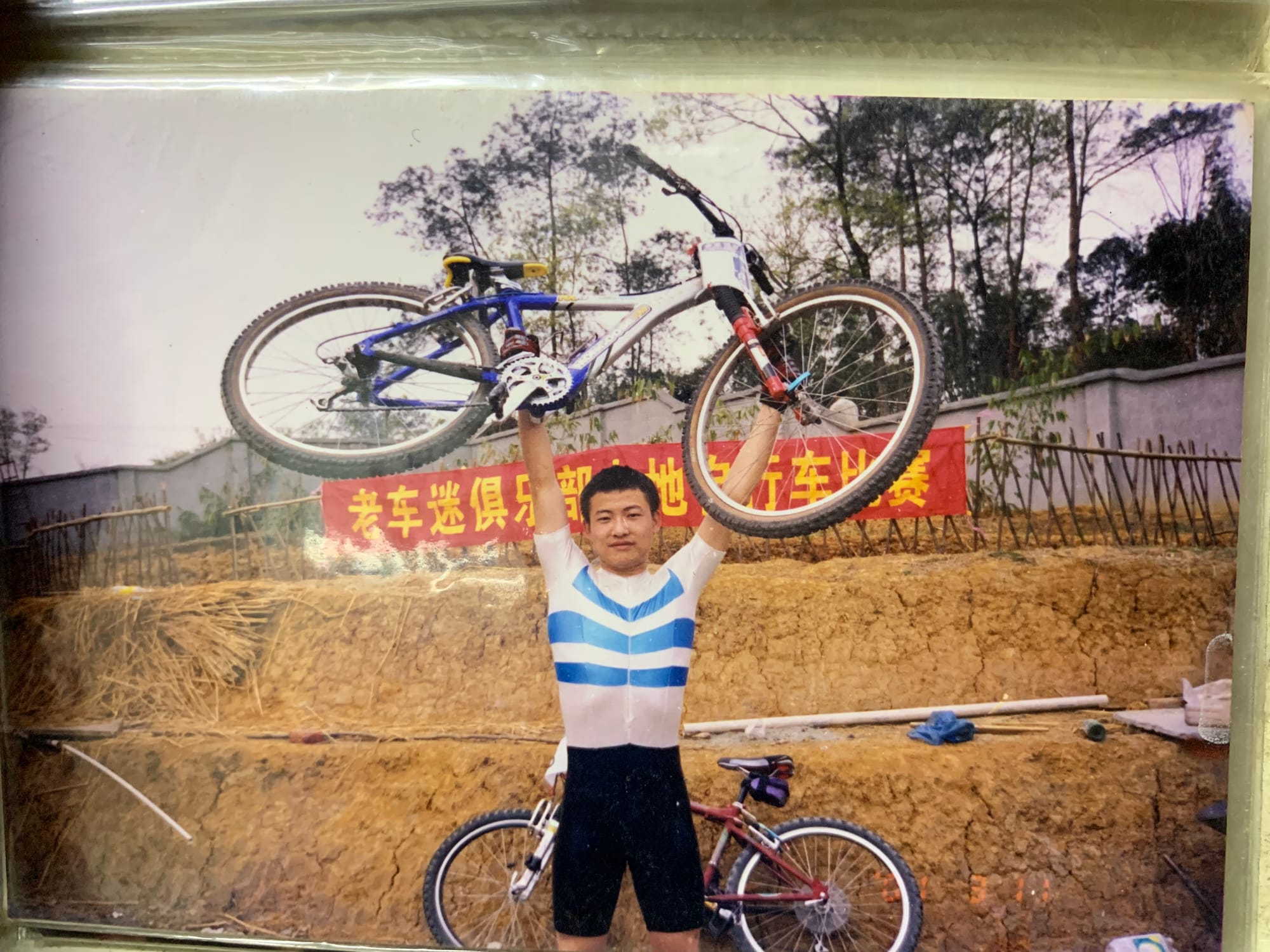
Hans's reflections on several critical issues led him to some profound conclusions:
- The Meaning of Sports: Hans, through studying and researching the history of sports, came to view sports initially as a form of training for hunting, with survival as its primary goal. Competitions served to enhance hunting skills. Over time, as tribes from different regions interacted and their territories overlapped, sports evolved from mere hunting skill training to encompass skills used in tribal conflicts over resources and territory. This evolution expanded sports from running and jumping to include individual throwing, physical combat, and eventually, team cooperation activities.
- The Significance of Competitions: Hans identified two main purposes of competitions. First, they serve to improve the level of proficiency in various sports through athletic contests. Second, they provide spectators with entertaining events that have an element of uncertainty in their outcomes. However, he acknowledged that competition is not the sole means of improving skills. Focusing solely on winning can undermine the developmental aspect of sports, as true progress requires an athlete to constantly strive to surpass their previous performances. Therefore, self-improvement and self-challenge are fundamental to breaking one's limits, regardless of whether one finishes first or last.
- The Development and Future of Chinese Sports: Reflecting on the broader context of Chinese sports, Hans recognized that the rigorous state system focusing on medal-winning can sometimes overshadow the intrinsic values of sports and personal growth. The system's tendency to quickly replace athletes based on physical attributes and performance metrics may not always align with the broader objectives of sports development and personal achievement.
In conclusion, Hans deduced that true growth in sports, and perhaps in life, is grounded in self-transcendence. This philosophy suggests that the essence of sports goes beyond external achievements and lies in the continuous personal journey of surpassing one's previous self.
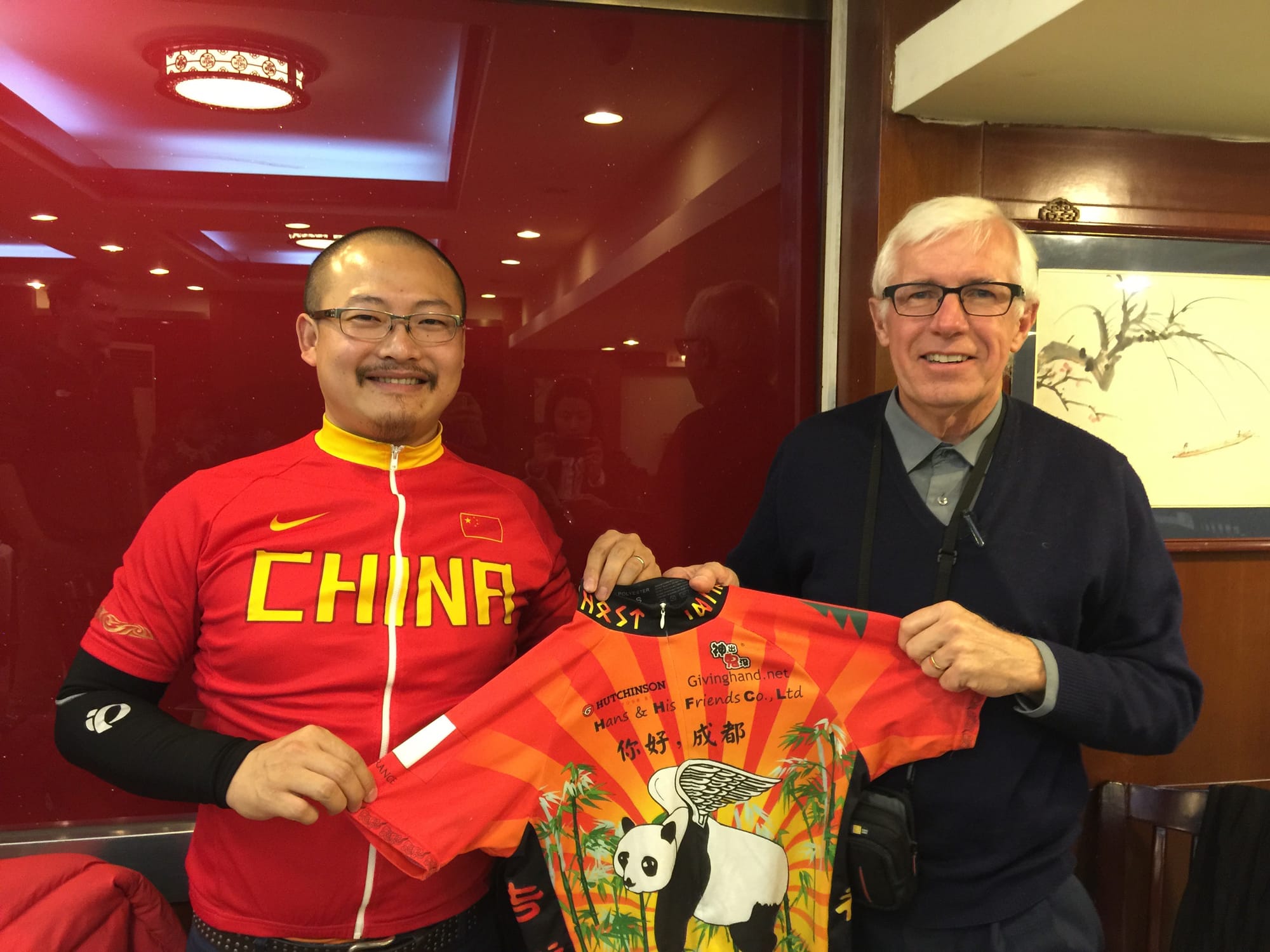
Pioneer of Sports Tourism in China
During Hans’ first investment in buying shares of a cafe, which sells food and beverages to backpackers from all over the world in a youth hostel in the center of Chengdu, 2002-2003, he was predestined to meet up with Peter Snow Cao, the founder of www.bikechina.com, a bicycle adventure tour company. Hans was the perfect cycling tour leader, as his sufficient cycling skills and capability, advanced bicycle mechanic skills and language skills, speaking English fluently while speaking Chinese as mother tongue. From 2003-2007, Hans was assigned to different cycling adventure tours more than over 200 days every year, leading cyclists exploring China on wheels.
Hans also started his cycling club, Ghost Riders, in Chengdu. The name was given by the local cyclists, as Hans was not found at the club most of the year, people only heard from him once a while. The shop was mainly a gathering place where Hans shared his trip experience and bicycle mechanic skills with early cycling group in Chengdu, as well as Hans organised many weekend training sessions, aiming to introduce another healthy hobby to the local. The club was finally permanently closed in 2010.
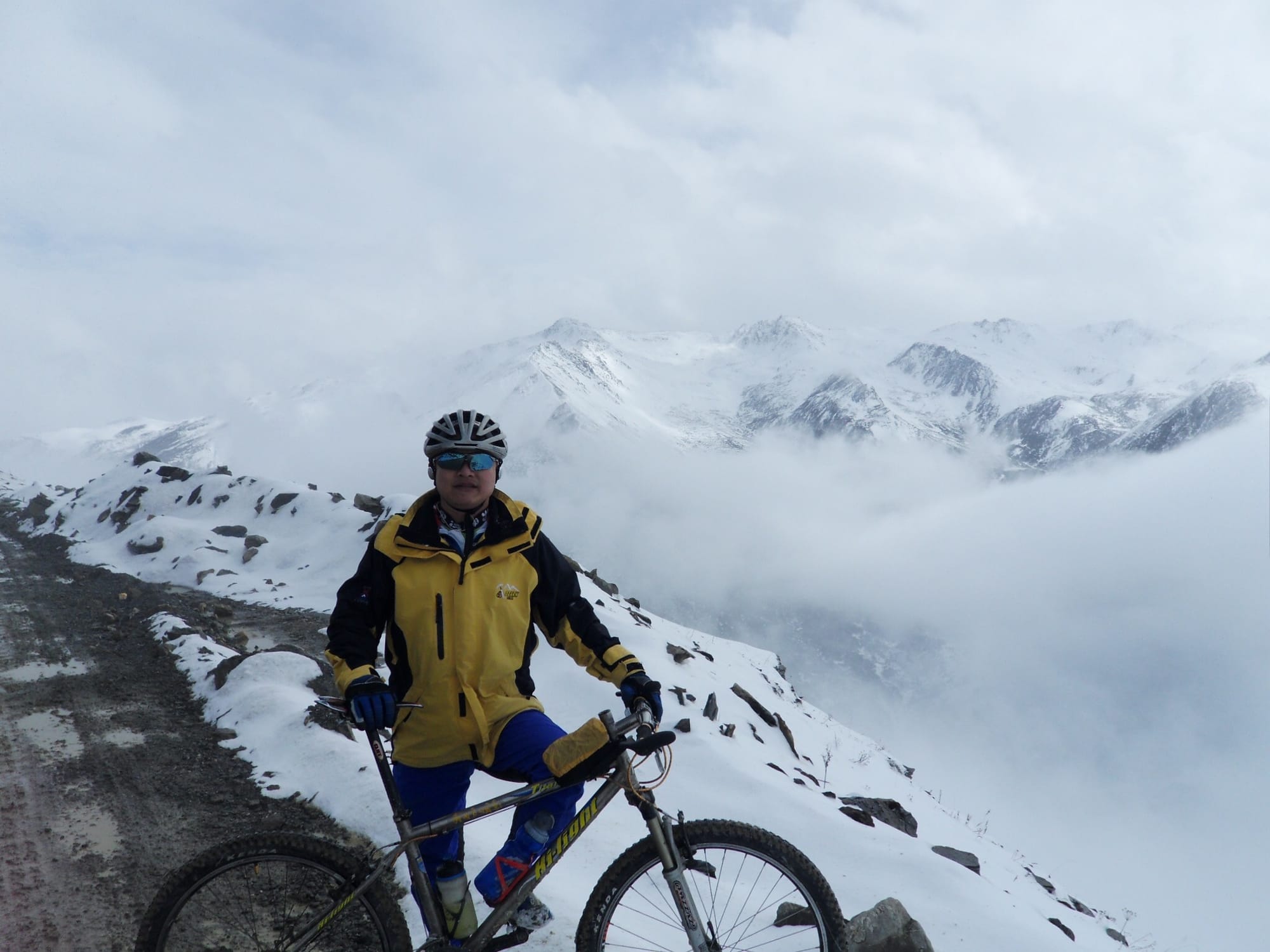
Cycling, a therapy to treating Hans’ PTSD
The devastating earthquake in 2008 that struck Sichuan's Wenchuan area and its surroundings, resulting in the tragic loss of nearly 70,000 lives and the disappearance of nearly 20,000 people, profoundly impacted Hans and his friends. They actively participated in a range of humanitarian efforts, including collective blood donation, collection and transportation of supplies, distribution of goods, refugee aid and relocation, and on-site rescue operations. These experiences, however, left Hans with severe post-traumatic stress disorder (PTSD), leading to recurring suicidal thoughts. This became a significant turning point in his life, prompting deep reflections on the meaning of life, the significance of living, and the relationship between individuals and the world.
Following this, Hans turned to two major avenues for coping and finding meaning. On one hand, he began studying Buddhism, delving into its essential philosophical concepts such as cause and effect, reincarnation, and impermanence. This exploration provided him with a spiritual framework to understand and process the trauma and existential questions he faced.
On the other hand, Hans sought solace and personal challenge in ultra-long-distance cycling. This physical and mental endeavor allowed him to challenge himself, providing a therapeutic escape from his suicidal ideation. Through this pursuit, Hans found a way to distance himself from thoughts of self-harm and instead focused on self-improvement and endurance, embodying the philosophy of self-transcendence and resilience in the face of adversity.
These experiences and his subsequent journey of healing and self-discovery underscore the complex interplay between physical activities, mental health, and spiritual growth, highlighting the multifaceted nature of coping with and overcoming trauma.
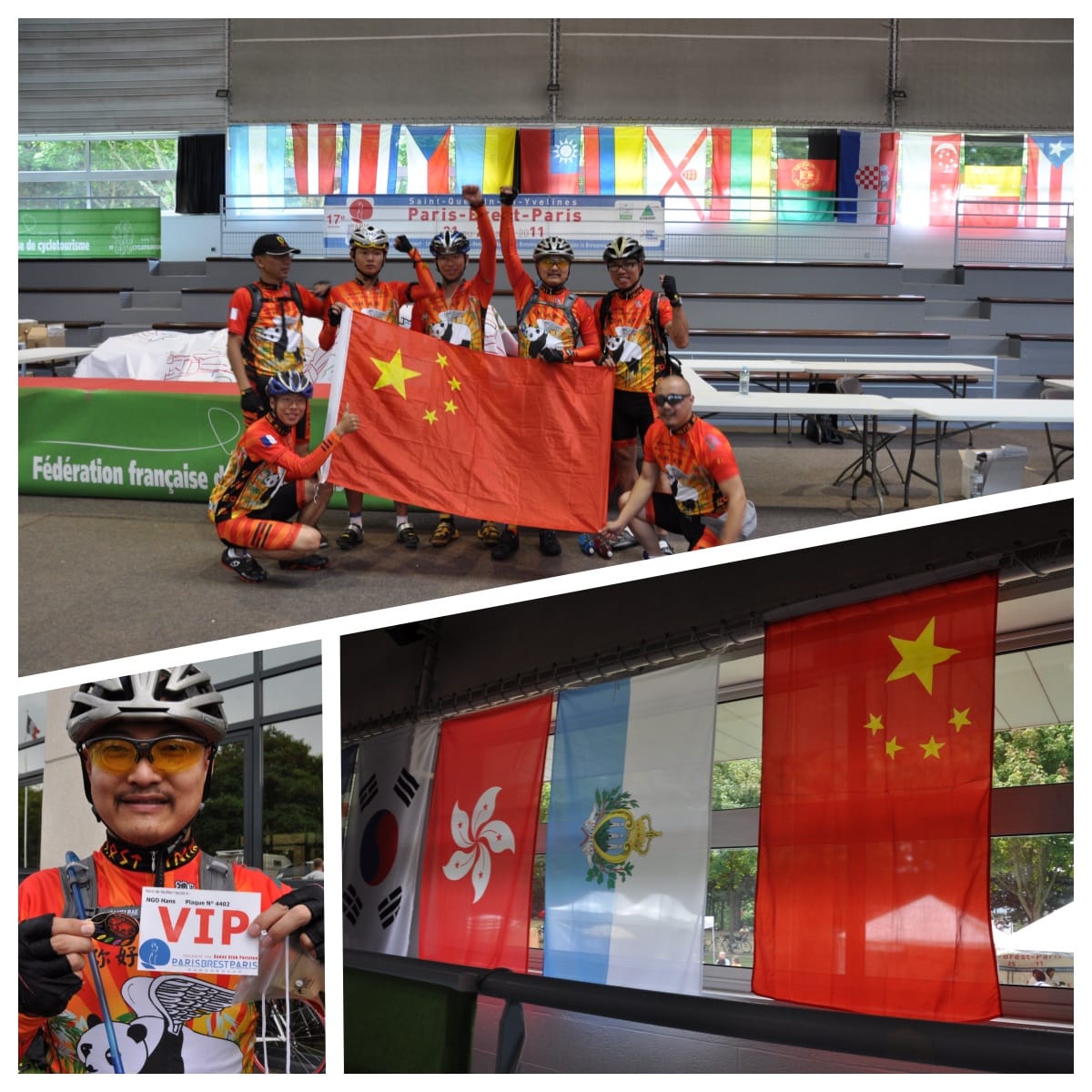
The 1st Chinese Cycling Team in Paris-Brest-Paris
Hans kept cycling further and further after each self-challenge. What he had done was called ultra-cycling in other part of world while he only did it for overcoming trauma.
In early 2009, Hans met Bobbi Fisher, the former head of the Wheelman Bicycle Club in Los Angeles, USA, and the leader of a post-disaster reconstruction project funded by Bo-le Human Resources. Bobbi suggested that Hans participate in Paris-Brest-Paris (PBP), a historic endurance cycling event with a history of over 120 years. The challenge of PBP is to complete a distance of 1230 kilometers within 90 hours, starting from Saint-Quentin-en-Yvelines, southwest of Paris, cycling to Brest, and then returning to Saint-Quentin-en-Yvelines. The route has remained largely unchanged since its inception in 1891.
With the support of the event organizers, Bobbi assisted Hans in organizing over 20 qualifying events in Chengdu, Sichuan, China, in accordance with the standards and rules of Audax Club Parisien (ACP). Finally, in 2011, they managed to organize a group of nine amateur cyclists from Sichuan to participate in the challenge in Paris, France. This marked the first time in history that a team from China was organized to participate in PBP, and it was also the first occasion that the Chinese national flag was hung in the sports stadium of Saint-Quentin-en-Yvelines.
This achievement was not just a milestone in the history of Chinese participation in international cycling events, but it also symbolized a significant cultural exchange and a testament to the resilience and spirit of the Chinese people post the 2008 earthquake. Hans's journey from coping with the aftermath of the earthquake to representing his country in a prestigious international cycling event highlights the transformative power of sports and the importance of international collaboration and support in the face of adversity.
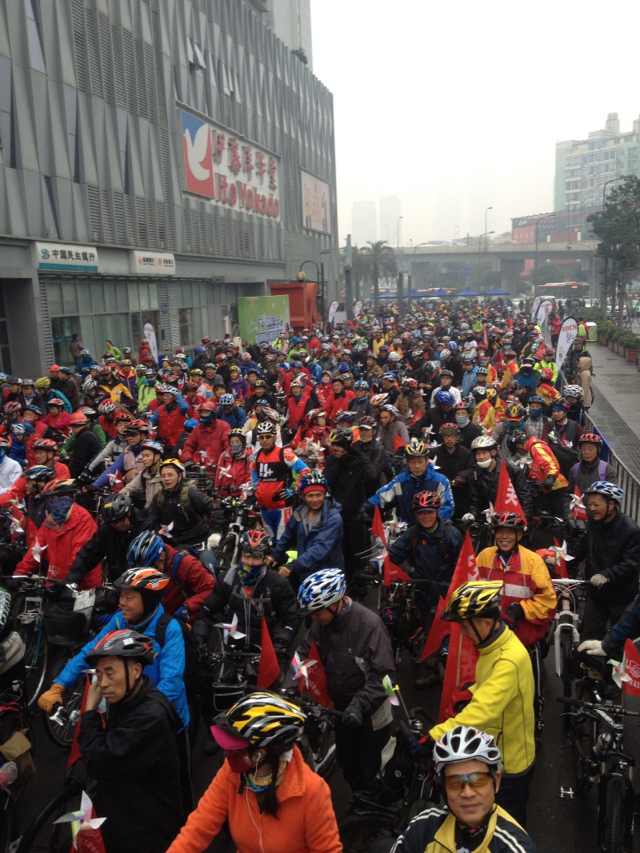
From One Traumatised Cyclist to Tens of Thousands of Ultra-Cyclists
In 2011, during the 16th edition of Paris-Brest-Paris (PBP), Hans and his friends noticed a significant gap between the development of grassroots sports in China and that in developed countries. Hans believed that sports should be accessible to all citizens, and thus, Olympic gold medals should not be seen as political objectives. The number of gold medals may not necessarily reflect the overall development level of public sports in a country. He theorized that if China's grassroots sports development reached the average level of developed countries, about 20% of the 6600 PBP participants should have been Chinese, equating to around 1320 Chinese participants. However, in 2011, only 9 Chinese athletes participated in PBP.
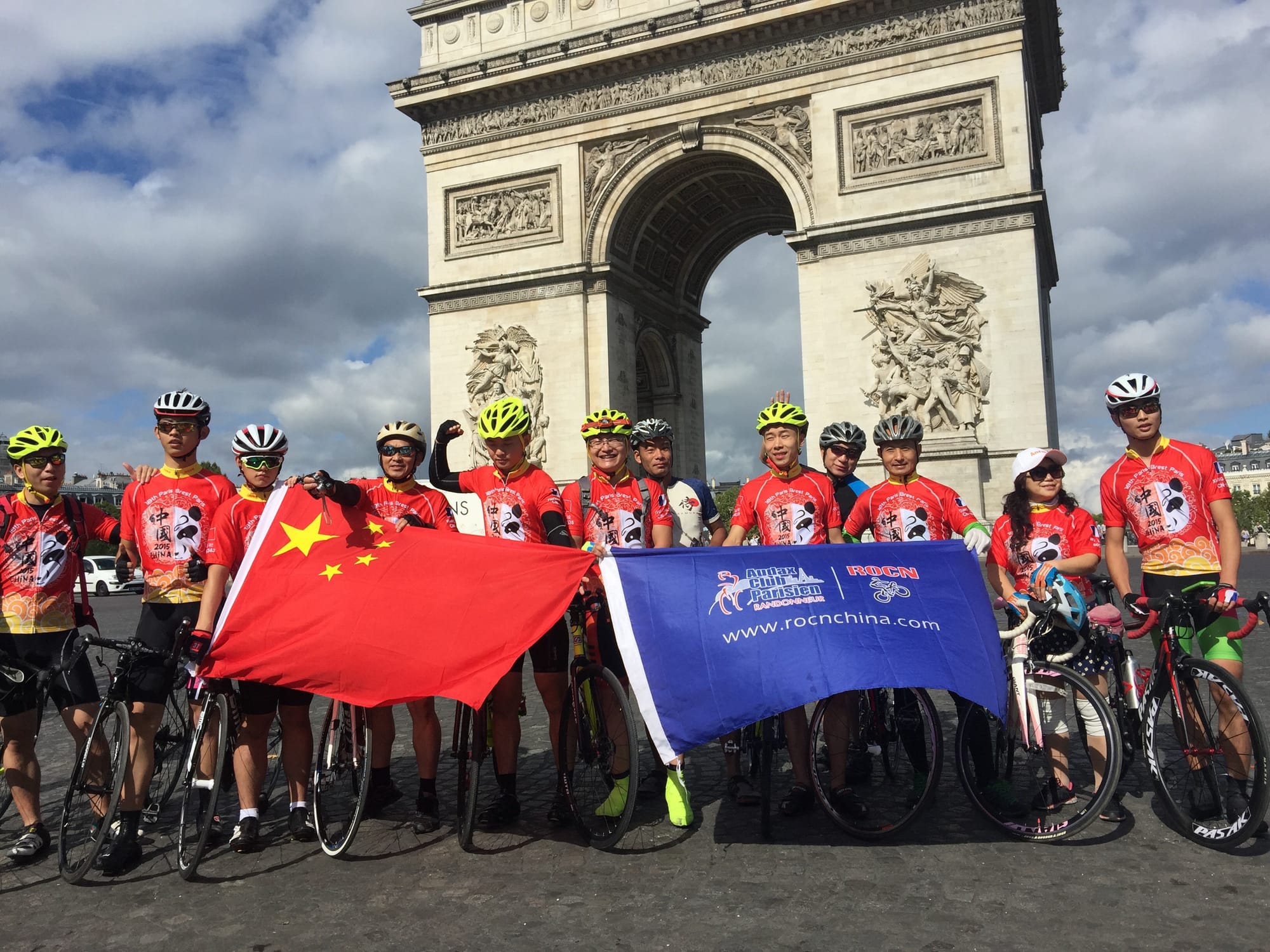
The reasons for the low participation rate of Chinese athletes included: 1. A general lack of awareness in the Chinese public about the significance of sports in life; 2. Economic constraints that made it difficult for individuals to afford training and participation costs; 3. The absence of events in China that encouraged self-challenging endeavors without the goal of winning medals.
Motivated by this realization, Hans and his friends dedicated themselves to increasing Chinese participation in the 17th edition of PBP in 2015. They aimed to promote the importance of sports in personal development and well-being, not just as a means to achieve political or nationalistic goals. Their efforts signified a move towards nurturing a culture where sports are embraced as a part of everyday life, encouraging personal challenges and growth beyond the pursuit of medals. This endeavor represented a shift in perspective, from sports as a means of national pride to sports as a tool for personal development and international camaraderie.
Facing significant challenges, Hans spearheaded the establishment of Randonneurs of China (ROCN), but encountered three major obstacles:
- Regulatory Challenges: In China, any association must be supervised and approved by a governing body related to its field of activity. Since the Sichuan Provincial Sports Bureau was already overseeing the Sichuan Province Cycling Association, whose core mission was to select athletes and organize competitions, Hans was unable to legally establish an association or receive support for organizing non-competitive endurance cycling events.
- Financial Difficulties: ROCN experienced severe funding challenges, making it difficult to sustain and grow its activities.
- Cultural Acceptance: At that time, the concept of endurance cycling was not widely accepted in society and was often seen as a form of self-torture.
To navigate these challenges, Hans opted for a compromise solution by establishing an event management company. Although ROCN could not legally register as an association, it operated under the guise of a company, organizing commercially-oriented public fitness activities. These events not only promoted public fitness and cycling-related products but also garnered limited support from the media and manufacturers.
Hans expressed gratitude to several key individuals for their support in his endeavor: Bobbi Fisher, who helped establish connections with the Audax Club Parisien (ACP) and assisted in quickly organizing internationally certified selection races; Xu Shaolian, the then-chief editor of the sports section of the Chengdu Commercial Daily, who helped publicize non-competitive endurance cycling in officially backed media; and Zhang Qiqi, head of the product promotion department at Tencent Dacheng Network, who helped disseminate event information through online media.
Through years of effort, Hans and his team successfully established 20 event operation centers across China and organized over 300 PBP qualifying races in 26 provinces and municipalities. The participation in a single event reached up to 3,300 people, and the total number of participants in ACP qualifying races organized by ROCN exceeded 100,000. This achievement marked a significant advancement in promoting endurance cycling in China, expanding its reach and acceptance in the wider community.
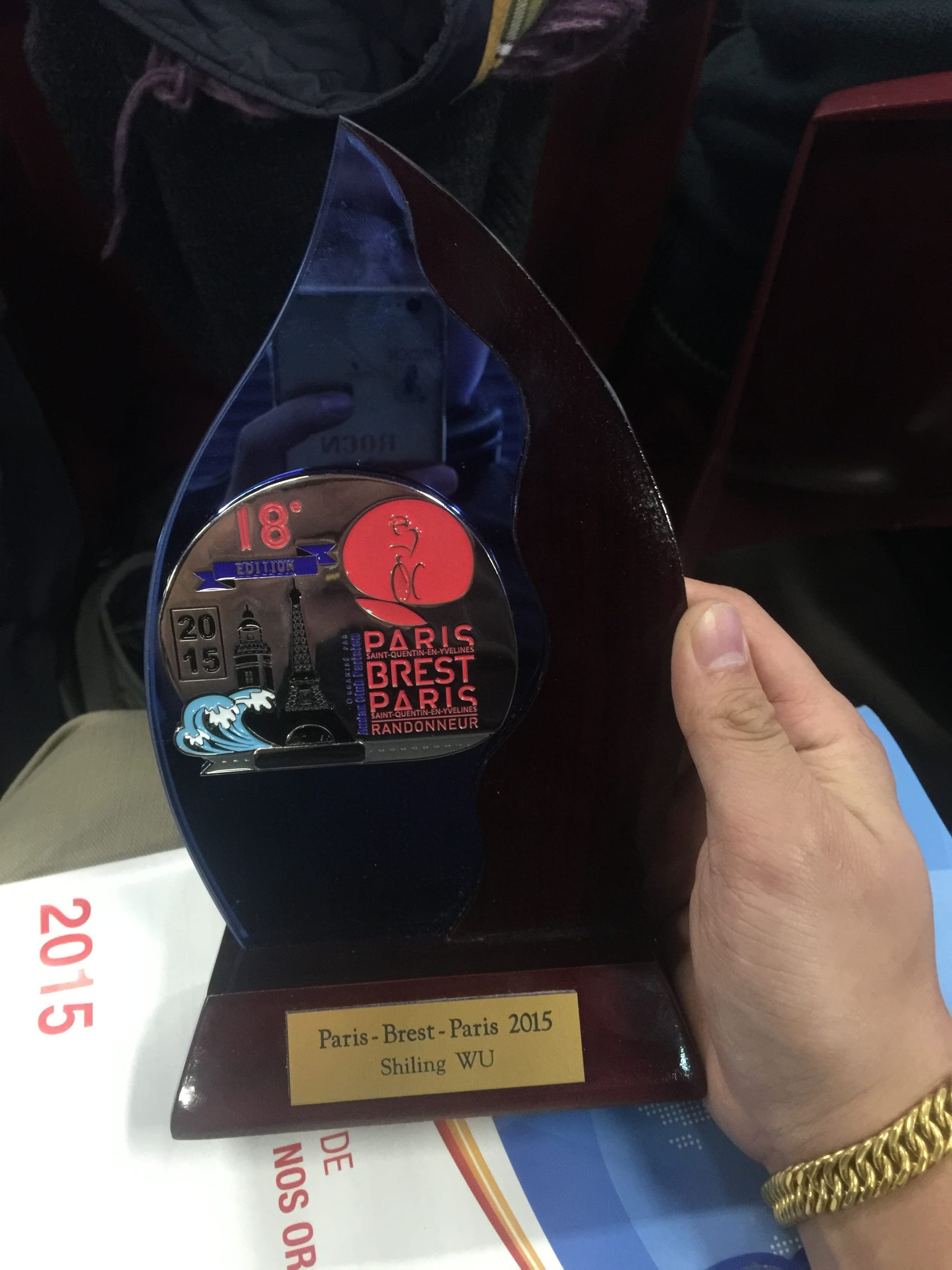
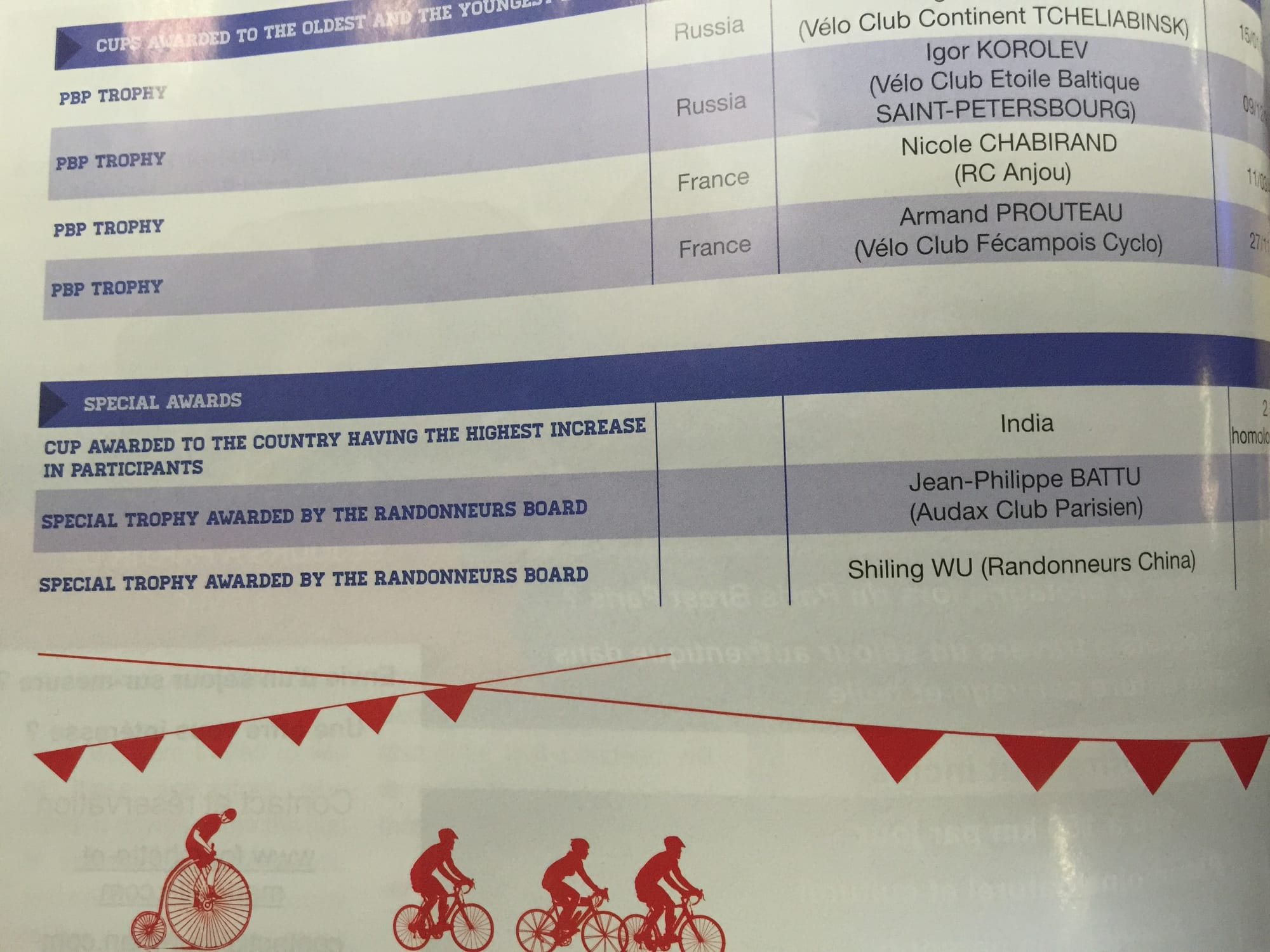
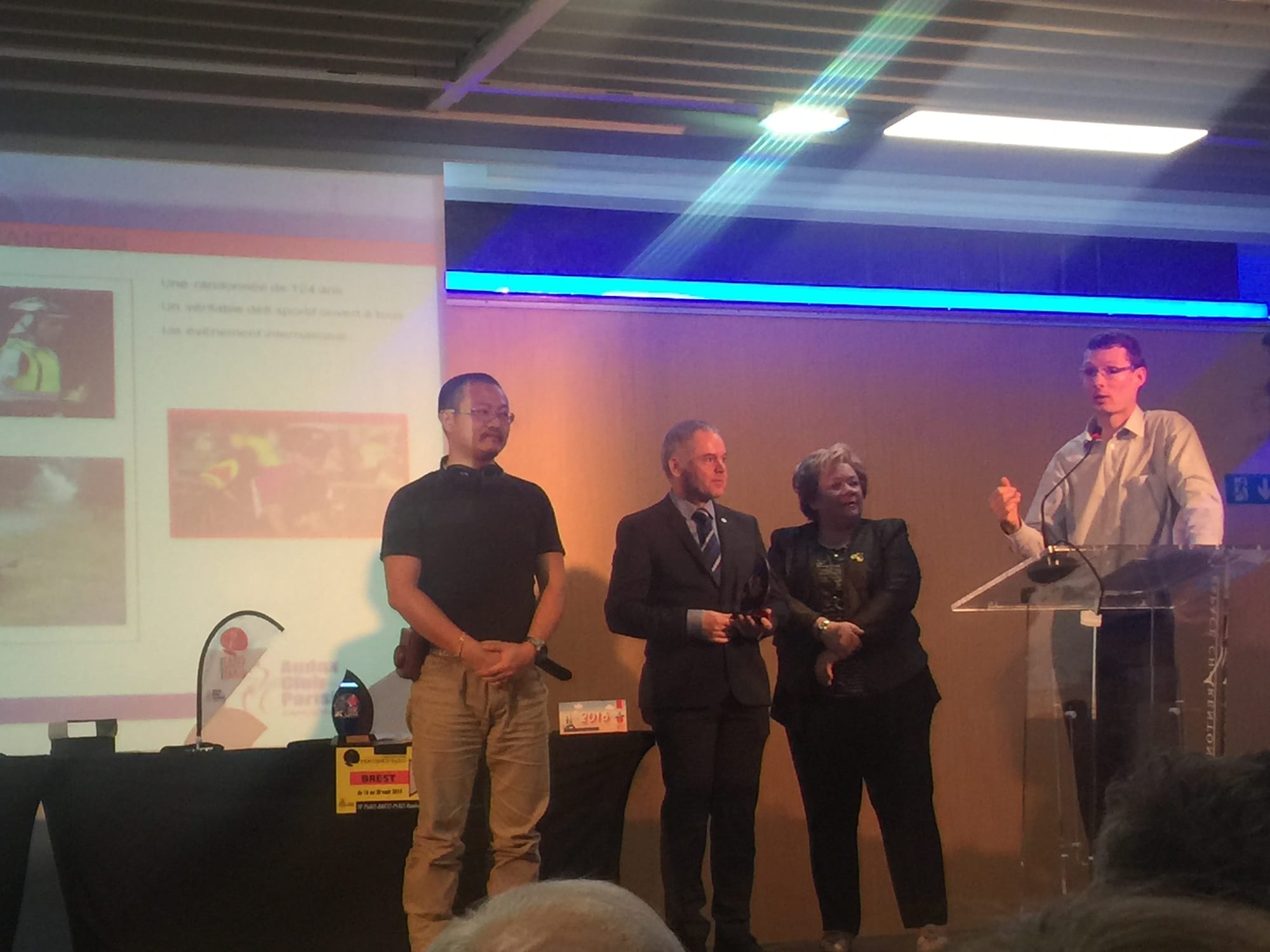
Special Trophy Awarded by The Randonneurs Board. 2016
Early 2016, Hans was awarded by ACP with
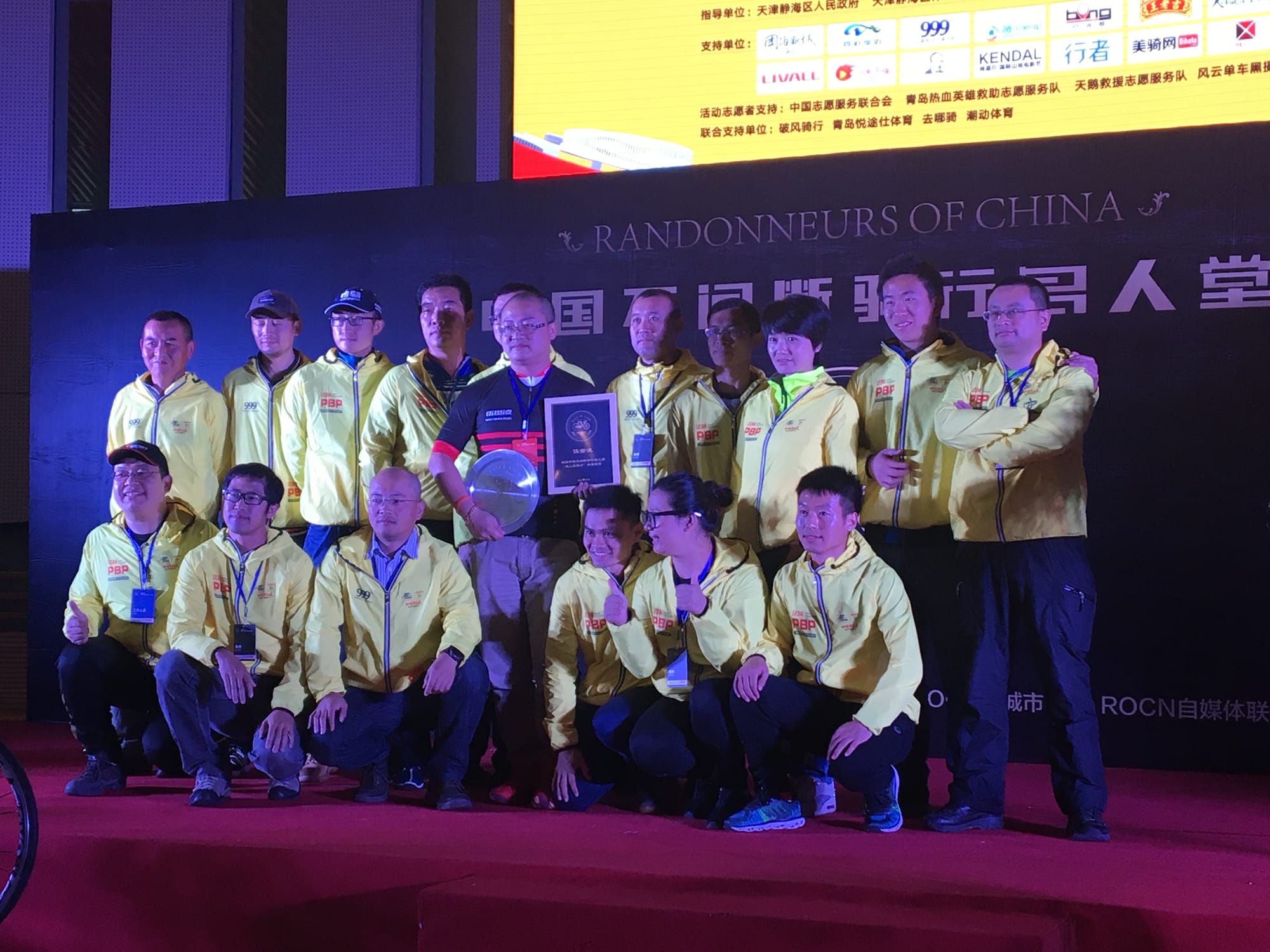
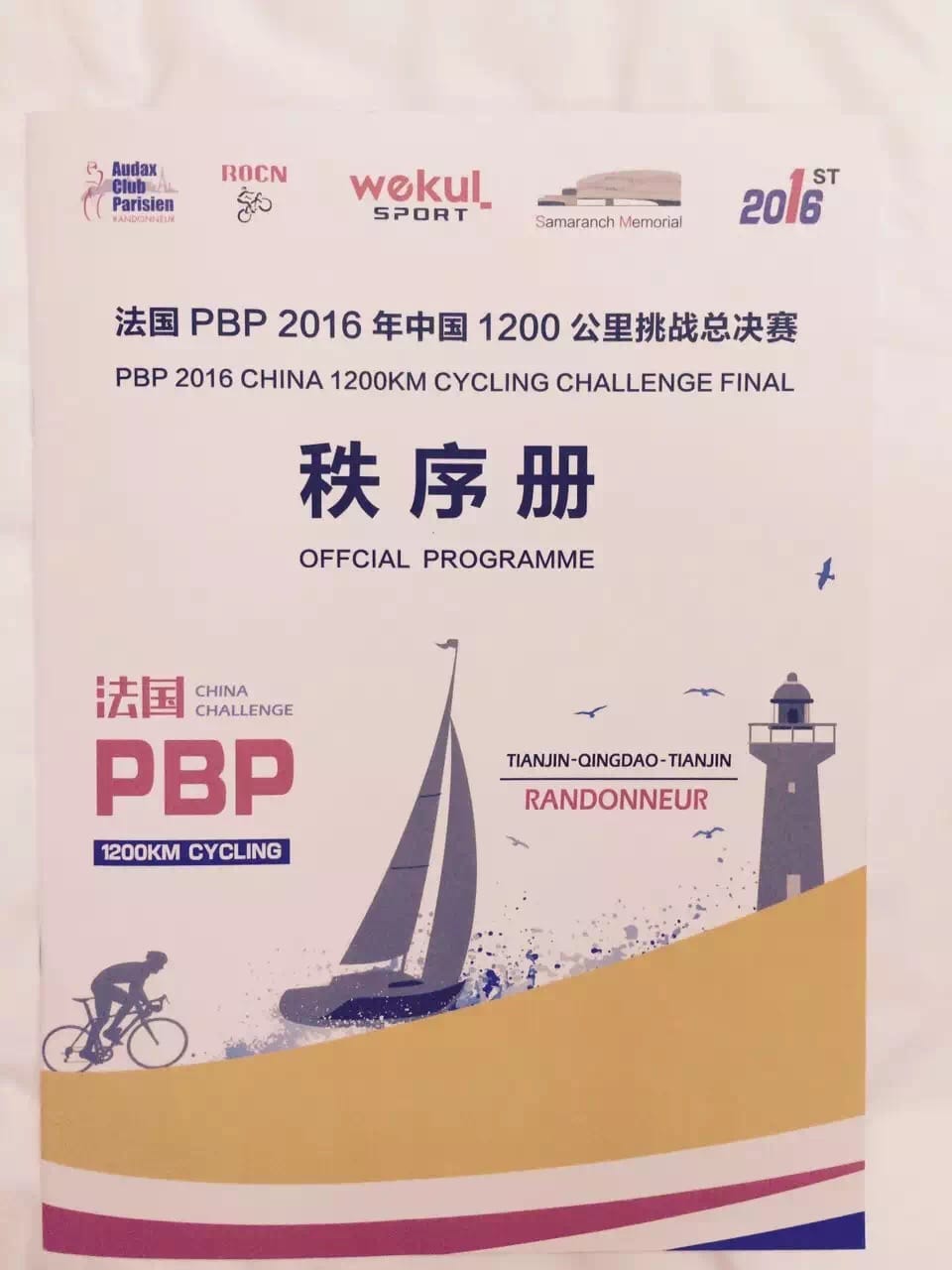
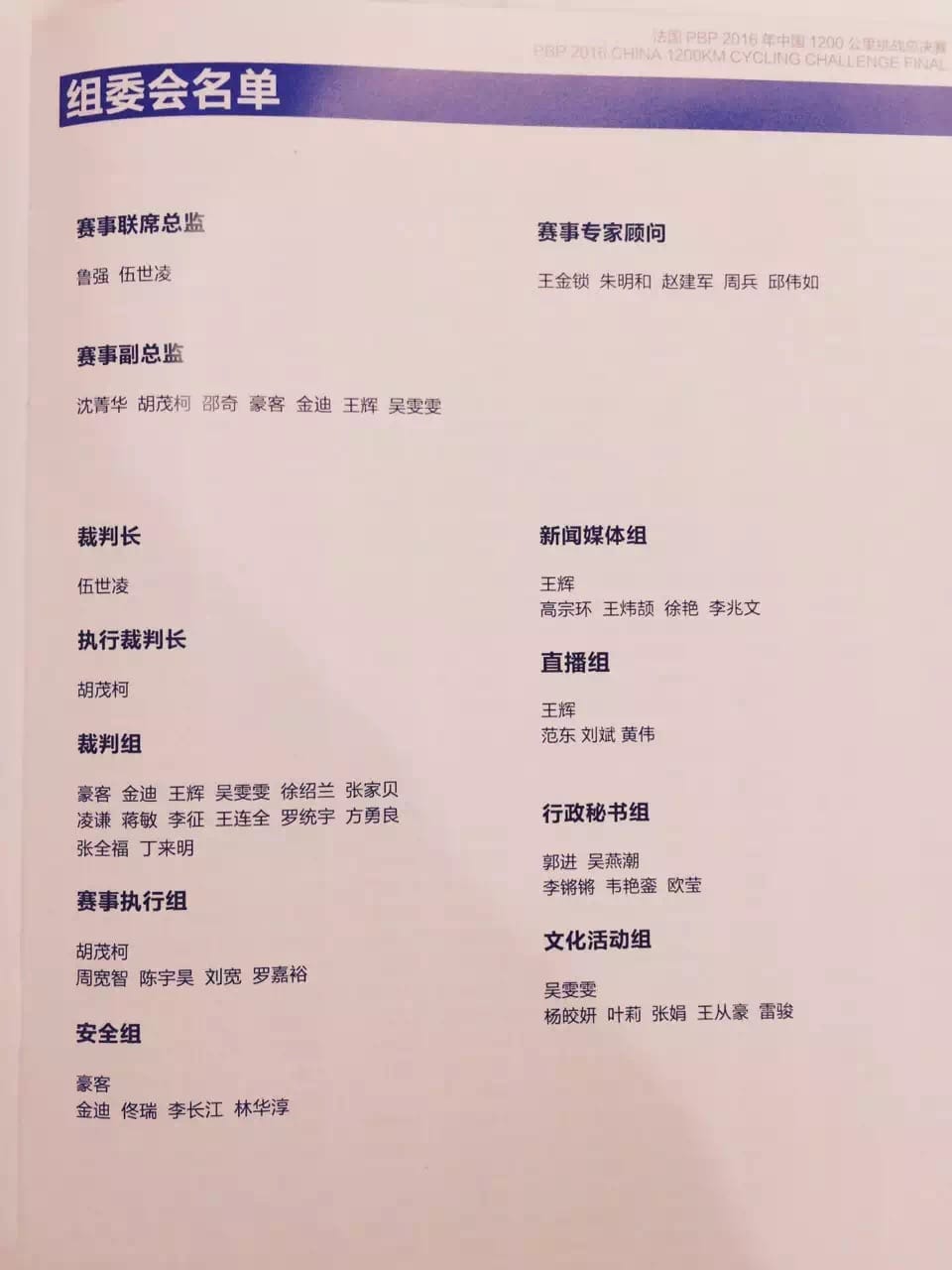
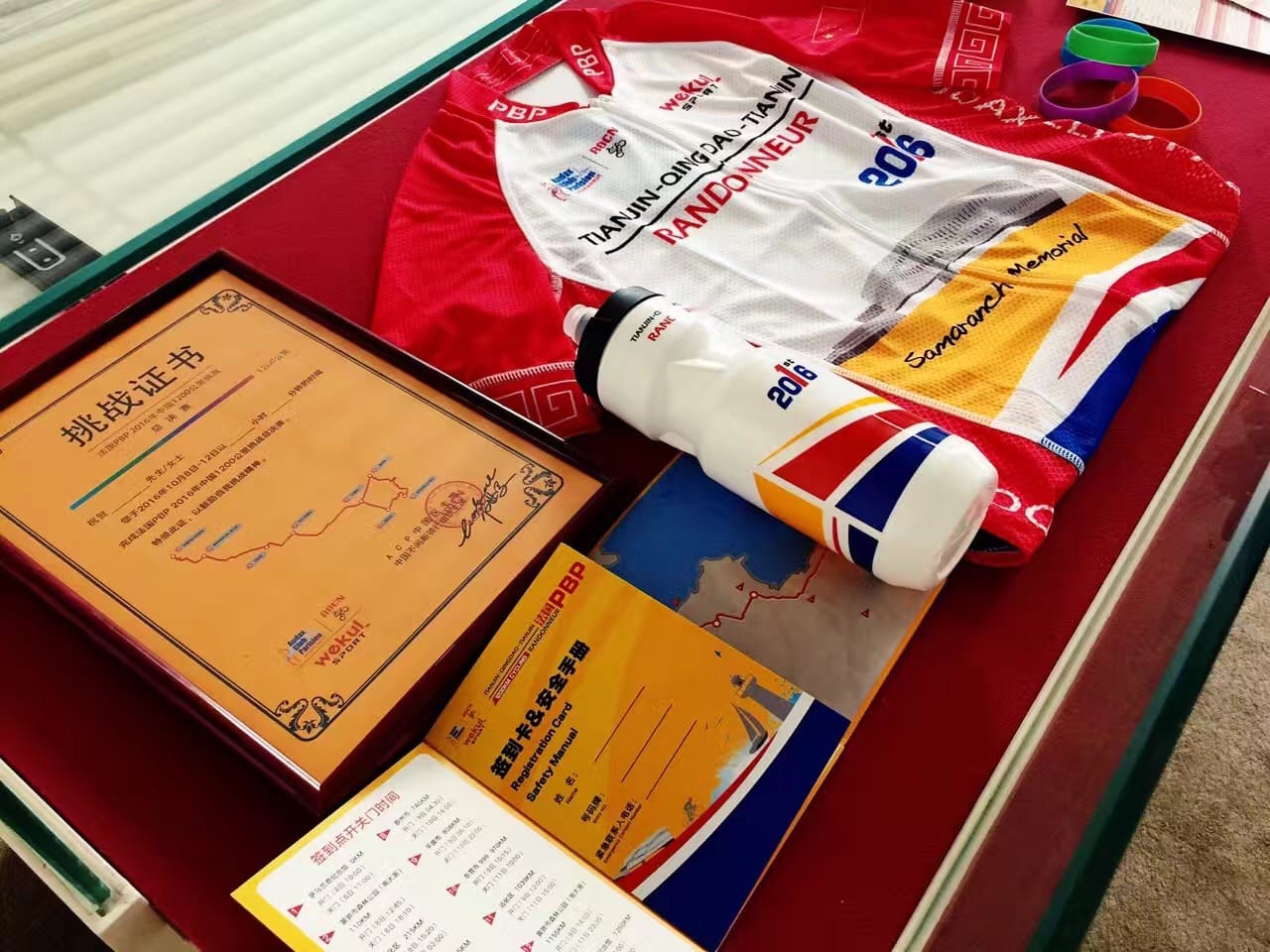
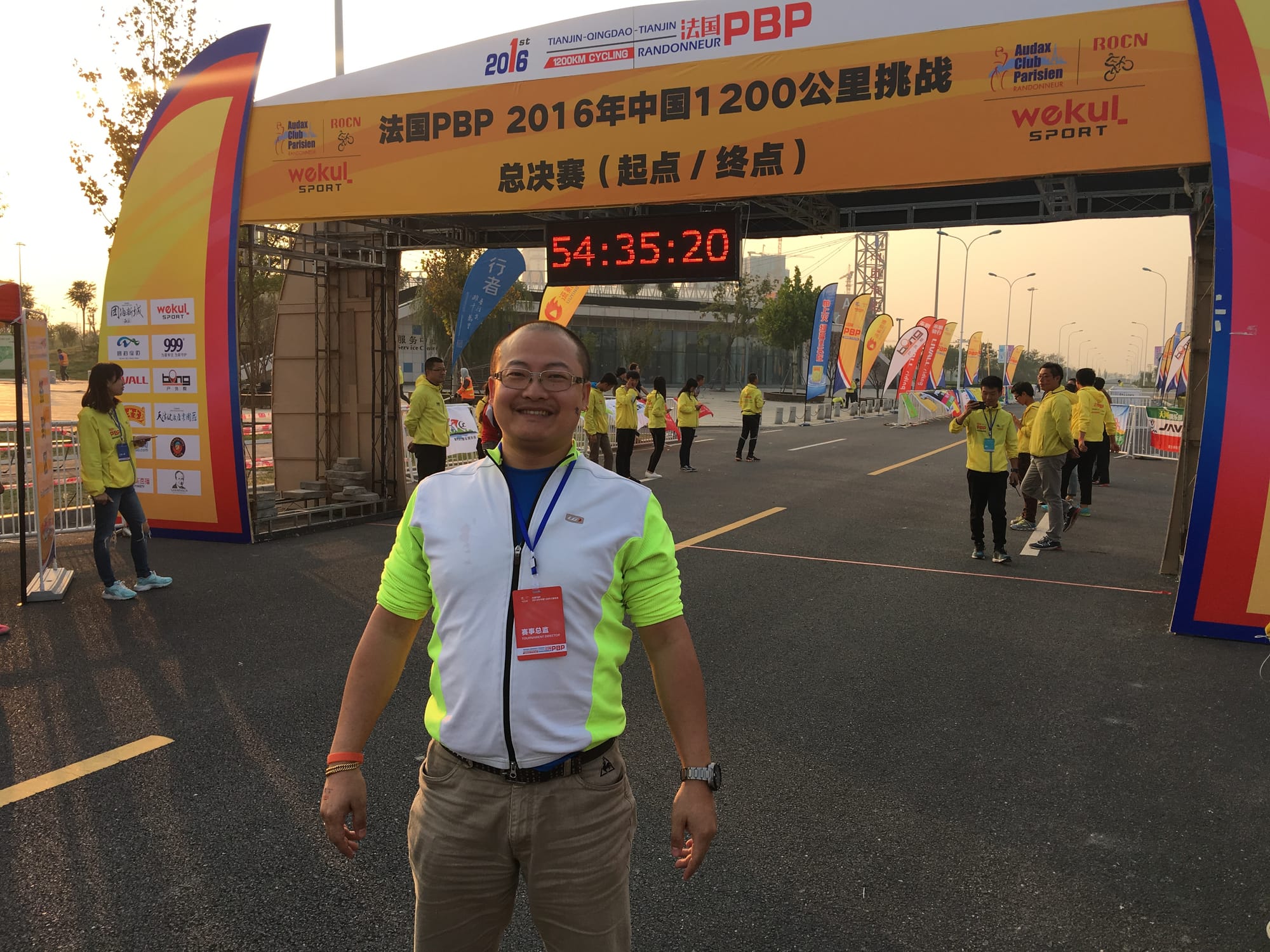
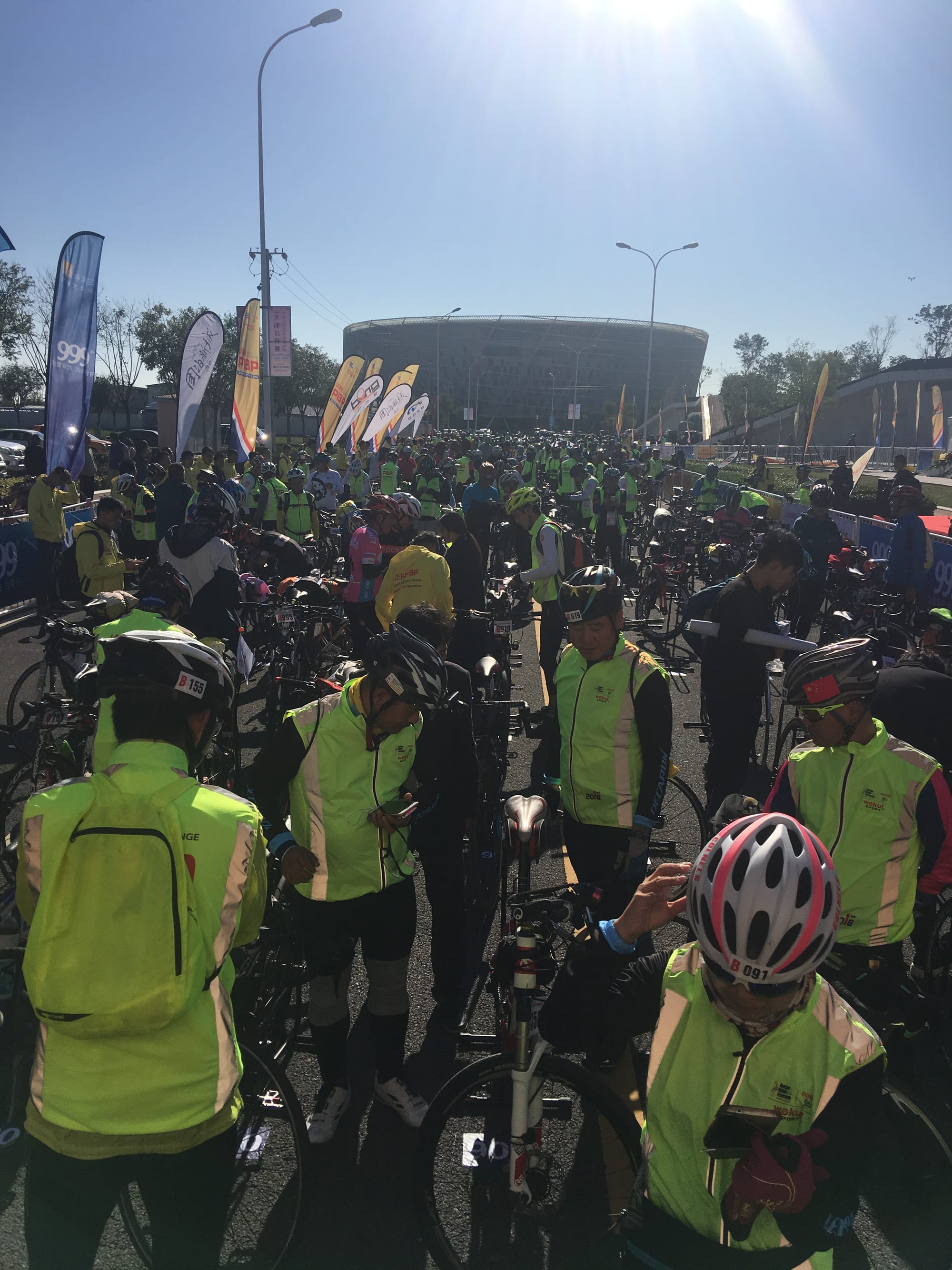

The 1st 1200KM Challenge Held in China, 2016.
The Tianjin-Qingdao-Tianjin 2016 Event
In 2015, Randonneurs of China (ROCN) organised 90 challengers to participate the 17th edition of Paris-Brest-Paris (PBP), marking a 900% increase from the number of participants in 2011. This surge in participation and the growing familiarity with ROCN and PBP within China led to a strong domestic demand for a Chinese version of the 1200-kilometer endurance challenge. Responding to this call, and with the support of the Tianjin Municipal Government and the Tuanbo Lake New District Tuanbo Group, ROCN authorized and supervised Shenzhen Weiku Sports Co., Ltd. to organize China's first 90-hour, 1200-kilometer non-competitive endurance cycling challenge in August 2016. Nearly 500 participants took part in this inaugural event.
The challenge started at the Samaranch Memorial Museum in Tianjin, with the turnaround point at the Qingdao Olympic Sailing Center. The route presented complexities due to varied traffic and road conditions, leading to an incident where a cyclist was injured during the night. Despite the hit-and-run situation with the vehicle involved, the organizational structure of the event, which included volunteer duty stations every 50 kilometers, allowed for rapid response and treatment of the injured cyclist. The local police swiftly apprehended the culprit the following day. The handling of the injured cyclist, covering medical expenses, and dealing with the perpetrator were all managed efficiently and effectively.
This event not only marked a significant milestone in China's endurance cycling history but also demonstrated the capability of domestic organizations to manage large-scale, complex sporting events. The success of the Tianjin-Qingdao-Tianjin challenge highlighted the evolution of grassroots endurance cycling in China, from its nascent stages to a fully-fledged and popular sporting activity, capable of attracting hundreds of participants and handling the challenges that come with such large-scale events.
The Demise of ROCN and the Post-ROCN Era
ROCN didn't actually come to an end; rather, it was forced into a hiatus by the broader societal context in China. The situation resembled the famous saying by Zeng Guofan, a renowned statesman from the late Qing Dynasty: "Avoid long-term profitable ventures and steer clear of highly contested areas."
Despite ROCN's years of sustaining itself through company-operated events, the landscape was changing. Other entities, eyeing the potential of "mass sports business," saw ROCN as an unendorsed grassroots event leader without government support. ROCN's success not only tantalized these competitors with the scent of lucrative sports business models but also served as a blueprint for those who had failed to secure ROCN's authorization for hosting events. This led to the replication of ROCN-styled events in various locations.
Furthermore, fractures developed between ROCN's headquarters and local organizers, resembling the feudal divisions of ancient Chinese dynasties. As a result, Hans stepped down from his role with the Audax Club Parisien (ACP) in 2017 and ceased to be the ACP's representative in China. He was well aware that he had reached his limit and that such an outcome was inevitable, especially in the contemporary socio-political climate.
Following Hans's departure, ROCN's activities faded, replaced by similar events under different names. It seemed as though successors were eager to establish their own legacies while erasing historical memories of their predecessors. With the loss of a leader focused on promoting the spirit of sports, endurance cycling in China veered towards commercialization. Remarkable developments occurred:
- A so-called "Chengdu-Lhasa International Challenge" was organized in regions largely inaccessible to foreigners, leading to the inevitable absence of foreign completers. This was used to downplay the route's exclusivity and fuel nationalistic sentiments with claims of Chinese superiority over foreign participants.
- The focus of events gradually shifted towards profit-making. Many localities ceased organizing events due to insufficient sponsor support, shrinking the coverage from 26 provinces and municipalities to smaller-scale activities centered around Beijing and Shenzhen.
Amid rumors of Hans monopolizing event profits, he initially faced much criticism. However, years later, as people began to reminisce about the atmosphere of endurance cycling during Hans's era, they reached out to him. His response was consistent: if running ROCN was profitable, he should heed Zeng Guofan's advice to avoid long-term profitable ventures; and if it was truly demanding, he deserved a long break. This response underlined his dedication to the true spirit of endurance cycling, distinct from the commercial motives that later dominated the scene.
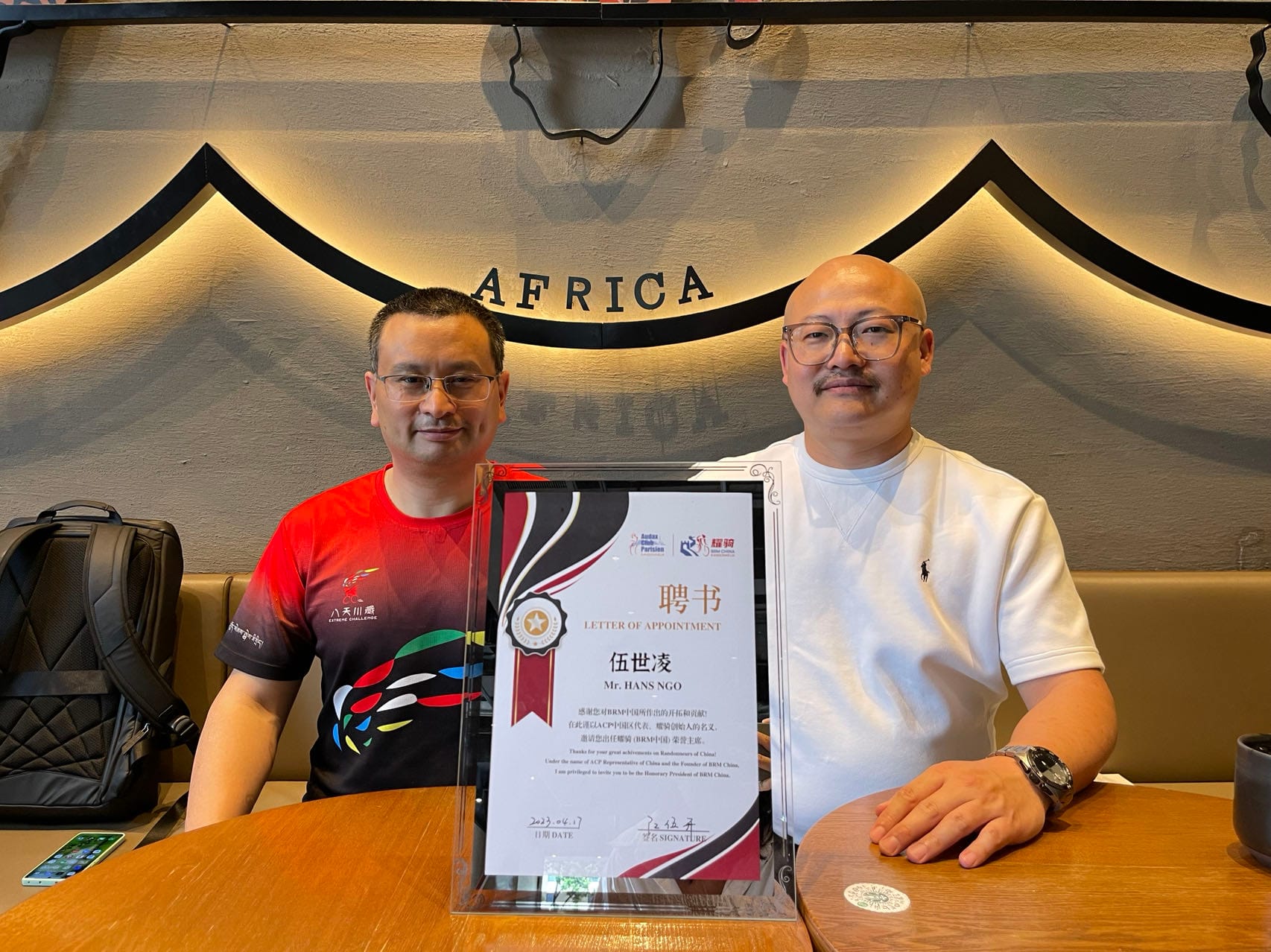
The Latest Honorary Position
In contemporary China, the concept of "filial piety" is highly contentious. Originating from traditional Confucian thought, it forms the core of familial relationships and obligations. However, filial piety sometimes isn't about younger generations following and respecting deserving elders. Instead, it can become a performance enacted by the younger to demand similar respect from their offspring, mirroring the deference they show to their elders. Thus, regardless of whether the elders deserve respect or the individuals themselves seek respect from their descendants, demonstrating respect for history becomes crucial. Failure to do so might give future generations a reason to criticize or rebel. This complexity is reflected in many historical transitions of power in China, often appearing peaceful on the surface but fraught with undercurrents, much like the transition from Hans's ROCN era to other events.
In late April 2022, Hans, who had stepped away from the cycling event management scene for many years, was approached by new event organizers. In a Starbucks café in Chengdu's High-Tech Zone, a simple ceremony was held to appoint him as the Honorary Chairman of Chinese Endurance Cycling. This title, while symbolic, acknowledges Hans's contributions and legacy in the field. It also reflects a reconciliation of sorts, a recognition by the new generation of organizers of the foundational work done by Hans and his team. This gesture, blending respect for the past with the progression of the present, is indicative of a nuanced understanding of tradition and change in modern China.

Hans is still riding.
Afterword by the Author
Hans repeatedly shared with me a profound insight: the process of human growth might be an ongoing journey of self-healing. Listening to his stories and viewing photographs of his past, his incredible experiences unfolded before me. When I first started conversing with Hans, what struck me most was the extraordinary nature of his life journey. It seemed implausible, almost beyond belief, that one person could embody such diverse, seemingly unrelated identities and experiences. Halfway through our conversations, it dawned on me: if all these events had indeed transpired, what was so unbelievable about them?
Hans asked for my assistance in compiling these narratives. He expressed a desire for an objective perspective on his life, even seeking help to understand his own rationale. He yearned for growth and longed for a mirror to reflect his flaws, a tool to help him recognize and confront his imperfections.
This task of narrating Hans's life story became more than just a chronological recounting of events; it evolved into a deeper exploration of a person's quest for self-discovery and understanding. His life, marked by resilience, adaptability, and a continuous striving for personal and communal betterment, serves as a testament to the complex, multifaceted nature of human experience. In Hans's story, we find not only the remarkable achievements of an individual but also a broader narrative of transformation, challenge, and the relentless pursuit of growth and understanding.
Follow P.A.N.D.A Odyssey
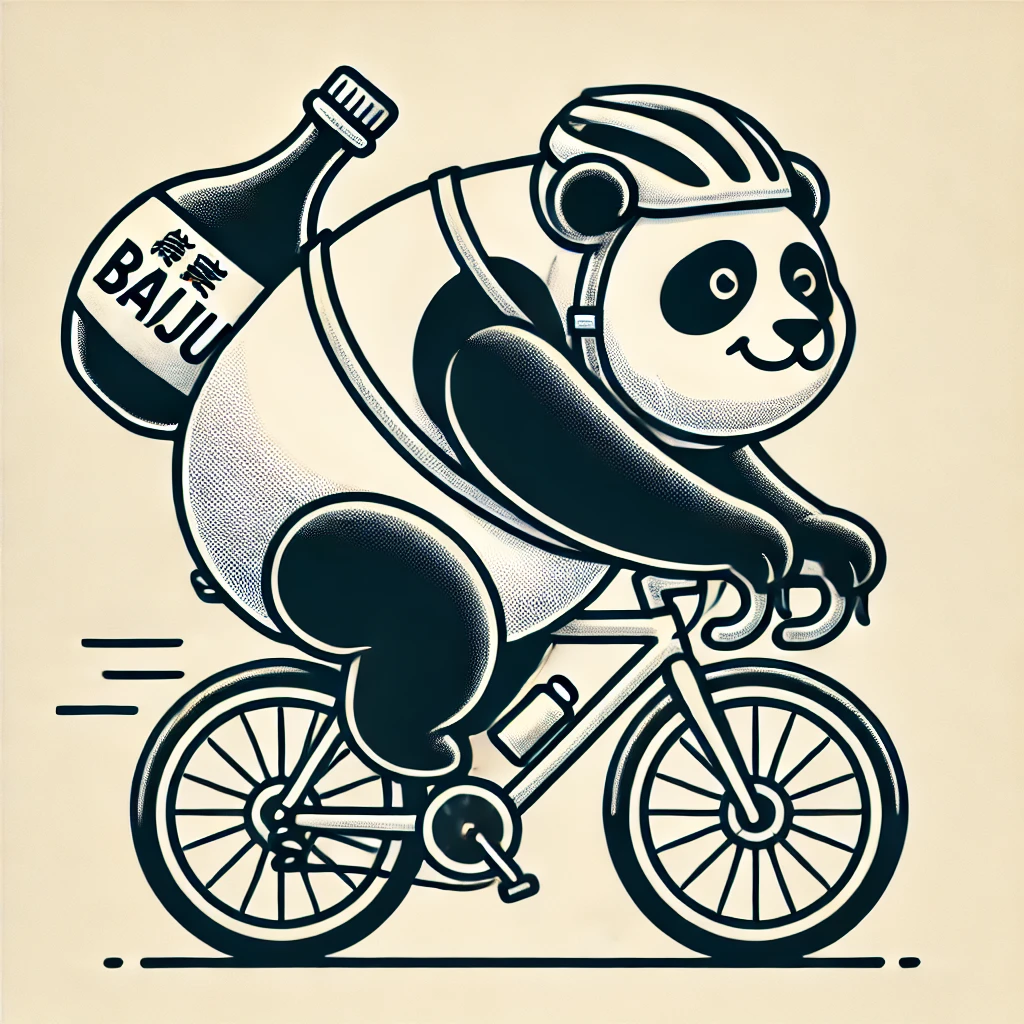
Some Other Sources
Larson, C. (2016) Road test, The California Sunday Magazine. Available at: https://story.californiasunday.com/long-distance-biking-in-china/ (Accessed: 18 December 2023).
中国不间断骑行协会 (no date, most likely 2009) 百度百科. Available at: https://baike.baidu.com/item/中国不间断骑行协会/2912236 (Accessed: 18 December 2023).
中国不间断骑行名人堂在天津揭幕(2016) 美骑网|Biketo.com. Available at: https://www.biketo.com/racing/30373.html (Accessed: 18 December 2023).
骑一辆车救一棵树 内地首次自行车"群聚效应"在成都举行 (2013) 骑一辆车救一棵树 内地首次自行车"群聚效应"在成都举行_四川在线. Available at: https://sichuan.scol.com.cn/fffy/201310/6242708.html (Accessed: 18 December 2023).
This link will be continously undated with expansion of related contents.
- Peter Snow Cao (?-)
- Bobbi Fisher (Dec. 4, 1948-Aug. 17, 2023)
- ACP(1903-)
- PBP(1891-)
- FFCT


